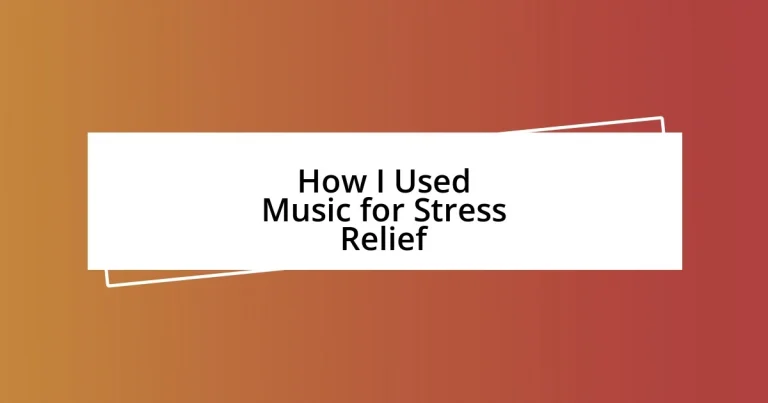Key takeaways:
- Music can lower cortisol levels and trigger emotional responses, making it a powerful tool for stress relief and mental health improvement.
- Creating personalized playlists enhances relaxation and emotional grounding, allowing individuals to connect memories and feelings to music.
- Incorporating music into daily routines and mindfulness practices fosters presence and calm, elevating overall well-being.
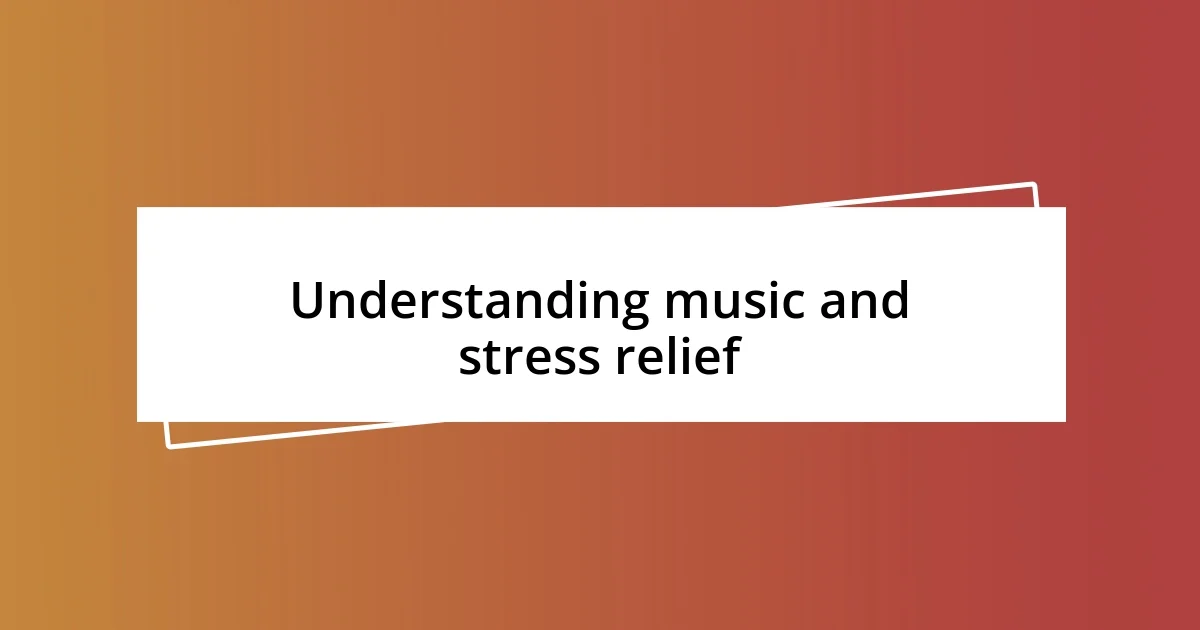
Understanding music and stress relief
Music has an incredible ability to tap into our emotions and alter our mood, which is something I’ve experienced first-hand during stressful periods in my life. I remember one particularly overwhelming week at work; I put on my favorite playlist, and suddenly, the tension in my shoulders began to melt away. Have you ever noticed how certain songs can transport you back to a moment of peace or joy?
When I dive into my favorite tracks, it’s as if I’m taking a mini vacation for my mind. Research shows that music can lower cortisol levels—the hormone responsible for stress. I still recall that one weekend spent in my living room, surrounded by candles and soft jazz, feeling all my worries start to fade. Isn’t it fascinating how something as simple as a melody can create such profound internal changes?
Moreover, certain rhythms and frequencies can have a direct impact on our physiological responses, promoting relaxation. I often find that instrumental music, particularly when it’s gentle and flowing, helps me focus and breathe more deeply. Have you ever felt the unique sense of calm wash over you when the right song comes on? It’s as if music speaks directly to our brains, soothing our frayed nerves and inviting tranquility into our chaotic lives.
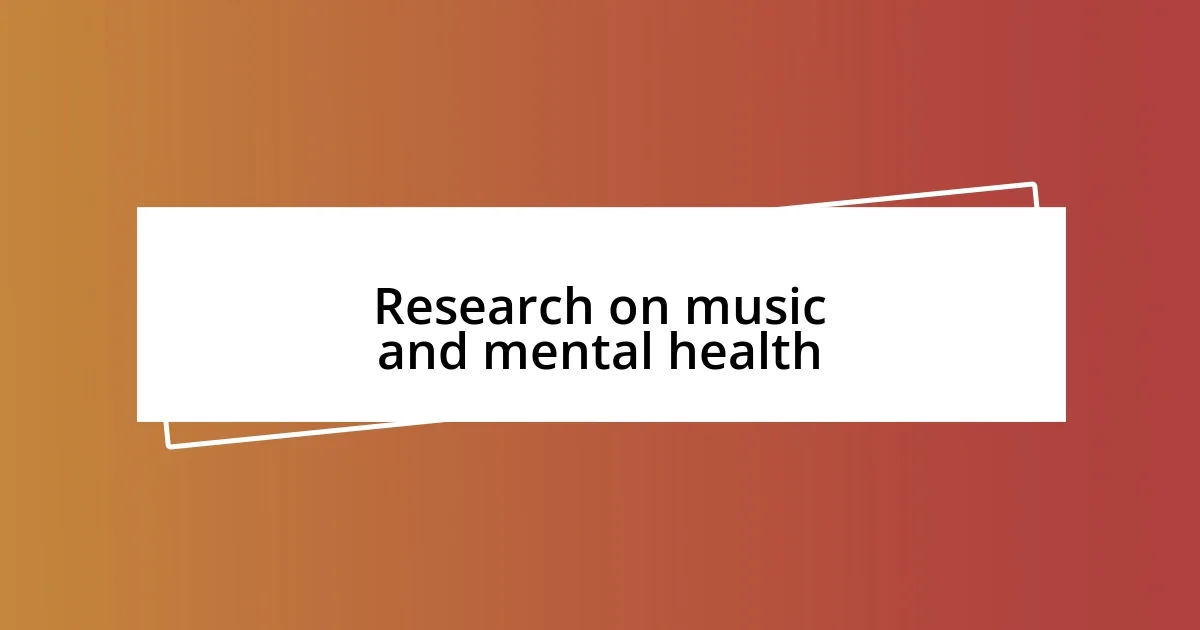
Research on music and mental health
Music is a powerful tool for mental health, as supported by various studies. For instance, research indicates that listening to music can activate the brain’s reward system, elevating our mood and providing comfort during anxiety or sadness. I’ve often found myself turning to upbeat tunes after a long, stressful day, and it’s remarkable how quickly my spirits lift.
When it comes to mental health benefits, music therapy has gained significant recognition. Clinical studies have shown that it can reduce symptoms of depression and anxiety, especially when integrated into treatment plans. I remember attending a workshop where live music played while we practiced mindfulness; the experience left me feeling genuinely more at peace, highlighting the transformative potential of music in therapeutic settings.
Additionally, specific genres have been linked to various emotional responses. Upbeat music can energize and motivate, while classical pieces often evoke relaxation. I’ve noticed that after an intense workout, the right playlist makes the post-exercise bliss even sweeter. The research supports my age-old belief: music isn’t just background noise; it’s fundamental to our emotional health.
| Study Focus | Findings |
|---|---|
| Music and Mood | Music activates the brain’s reward system, uplifting mood. |
| Music Therapy | Reduces symptoms of anxiety and depression when included in treatment. |
| Genre Effects | Different genres can evoke unique emotional responses. |
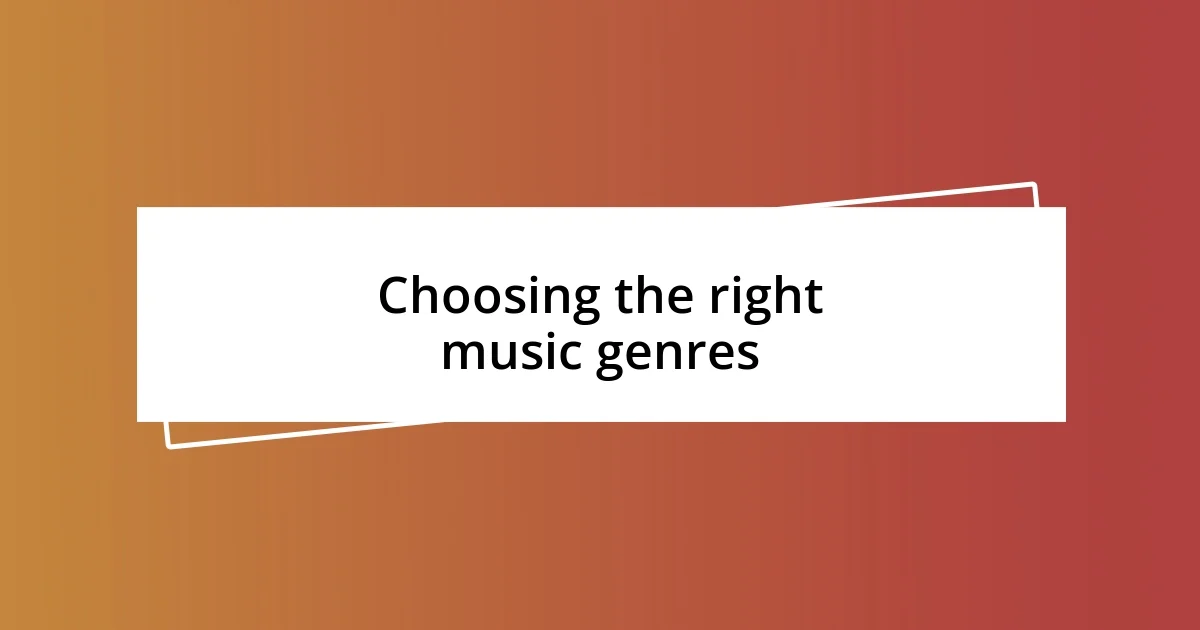
Choosing the right music genres
Choosing the right music genre can make a world of difference when it comes to stress relief. Personally, I’ve discovered that my mood often dictates my musical choices. For instance, when I’m feeling particularly anxious, I gravitate toward ambient music. The soft textures and subtle melodies wrap around me like a warm blanket, making it easier to let go of that pent-up tension. Similarly, I’ve found that when I’m in need of motivation, a lively pop song can instantly energize me.
Here are some music genres to consider for stress relief:
- Classical: Often calming, it can help reduce anxiety and promote relaxation.
- Ambient: Great for creating a peaceful atmosphere, perfect for unwinding.
- Jazz: The improvisational nature of jazz can soothe and inspire a calm mind.
- Nature sounds: Combined with gentle melodies, they can transport you to a tranquil space.
- Upbeat Pop: This genre can lift your spirits and motivate you during tough times.
In my experience, the key is to listen to how each genre makes you feel. It’s about finding what resonates with you personally. I still remember a time when my go-to rock anthems couldn’t drown out the chaos of a stressful day. Since then, I’ve learned that switching to something softer, like acoustic guitar, can shift my mindset—a small adjustment that bears fantastic results.
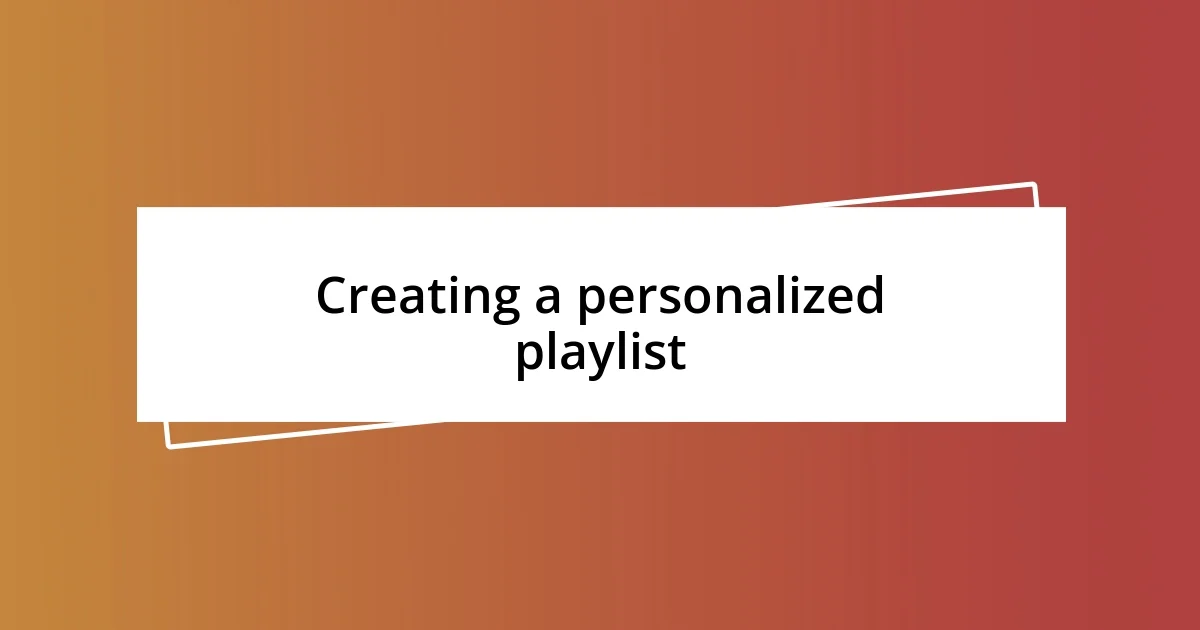
Creating a personalized playlist
Creating a personalized playlist is like crafting a sonic sanctuary. I remember the first time I compiled a playlist specifically meant for unwinding after a stressful day. As I scrolled through my music library, each track felt like a step toward relaxation, connecting me to different moments in my life. It’s that mix of nostalgia and soothing sounds that makes a playlist truly special.
I’ve found that layering different genres can amplify the experience. For instance, starting with gentle acoustic songs can create a mellow mood, while sprinkling in some soft electronic tunes can gently lift the energy. Have you ever noticed how a particular song can instantly transport you back to a specific memory? That’s the power of personalization—my “calm” playlist often includes tracks that remind me of serene evenings spent with friends, which adds an extra layer of comfort.
When creating my playlists, I also pay attention to the order of the songs. I typically start with slower pieces, gradually building in tempo, as this mirrors how I naturally transition from stress to relaxation. It’s almost like a musical journey! The result is not just a collection of songs but a tailored experience that resonates emotionally. What do you want your music to communicate to you? It’s about finding the right songs that echo your thoughts and feelings, making each listen a unique ritual in calming your mind.
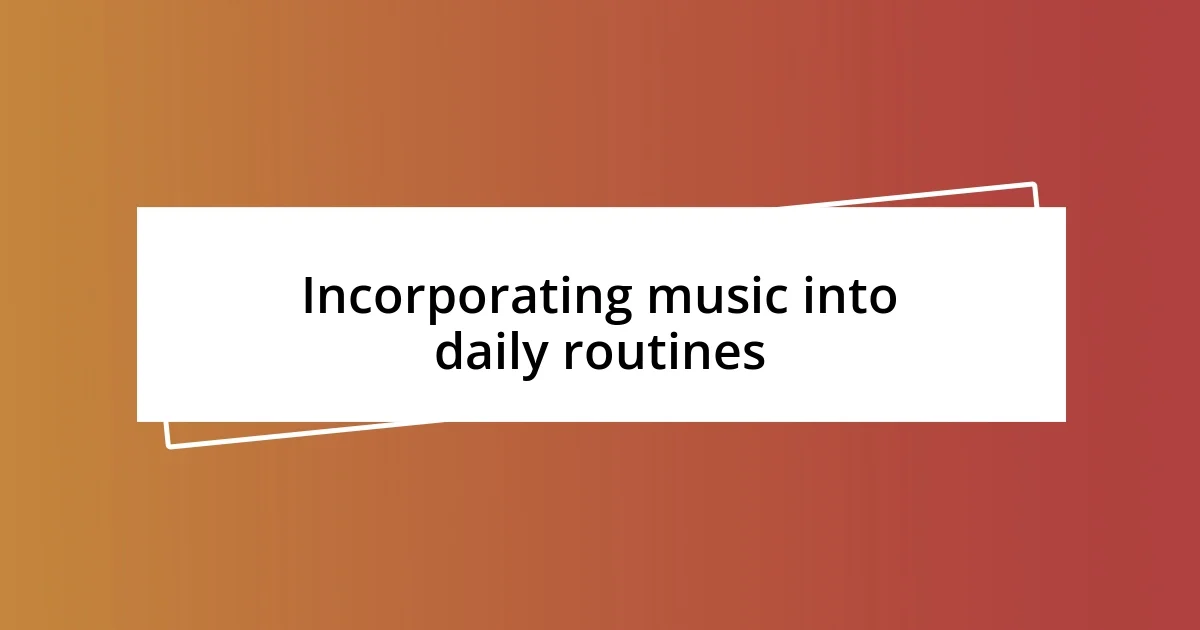
Incorporating music into daily routines
Incorporating music into my daily routine has been transformative. I often start my mornings with a curated playlist that energizes me for the day ahead. There’s something about an upbeat tempo, like my favorite indie tracks, that makes getting out of bed a bit easier. Have you ever noticed how music can shift your mindset even before breakfast? I certainly have.
Throughout the day, I rely on music to help me focus while I work. I remember a particularly stressful week when deadlines loomed large. I discovered that playing instrumental music in the background—a mix of piano sonatas and minimalistic electronic beats—created a bubble of concentration for me. Each note seemed to push the stress away, allowing me to dive deeper into my tasks. It’s fascinating how the right sound can transform a hectic atmosphere into a haven of productivity.
Even during my evening wind-down rituals, I’ve incorporated music to signal the end of the day. I choose a few gentle tracks to play while I prepare dinner or read, creating a calming backdrop. It’s almost like setting the mood for relaxation. I often reflect on how those moments spent with music help me transition from the busyness of life to a peaceful evening. What does music do for you at the end of your day? For me, it cultivates a sanctuary that invites rest and reflection.
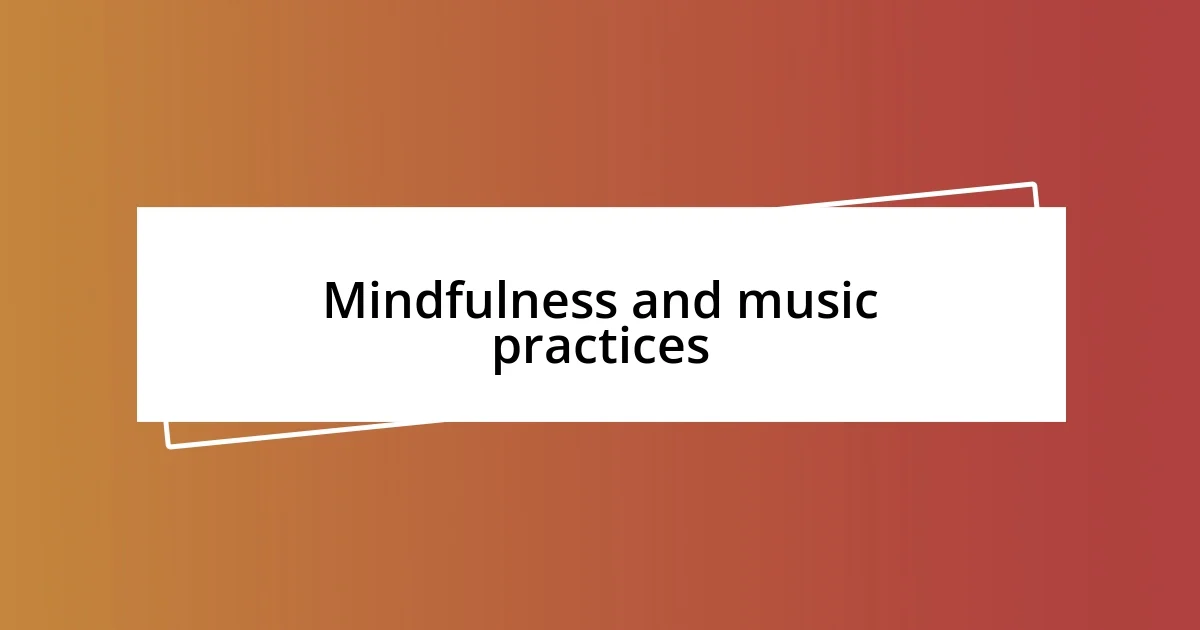
Mindfulness and music practices
Mindfulness and music practices can create a profound sense of presence and calm. I remember trying a simple exercise where I would sit quietly with my eyes closed, letting my favorite instrumental music wash over me. At first, my thoughts raced; I was thinking about the day’s tasks. But as I focused on each note, I found myself grounding in the moment, allowing the music to guide my breath. Have you ever let a melody pull you into a deep state of relaxation? It feels like the music becomes a gentle anchor, holding you still amidst the chaos.
Engaging in mindful listening is another powerful practice I’ve embraced. I take time to truly focus on the layers of sound in a song—like the harmony, rhythm, and even the silence between the notes. I recall one evening, I sat by my window with a cup of tea, listening to a string quartet. The beauty of each instrument slowly unfolded, pulling me into a meditative state. It reminded me how often we rush through our days, missing the beauty in the details. Doesn’t the act of really hearing music encourage us to appreciate our surroundings more?
Additionally, I find that combining mindfulness with music can elevate my meditation practice. Instead of the usual silence, I often play soft ambient music in the background. I remember a time when I felt particularly overwhelmed. As I closed my eyes and let the gentle sounds flow, I felt my body relax with each note, releasing the tension I didn’t even know I was holding. It’s amazing how music can serve as a companion on the journey towards inner peace. How do you think music contributes to your mindfulness practices? For me, it’s a reminder that tranquility can be just a song away.
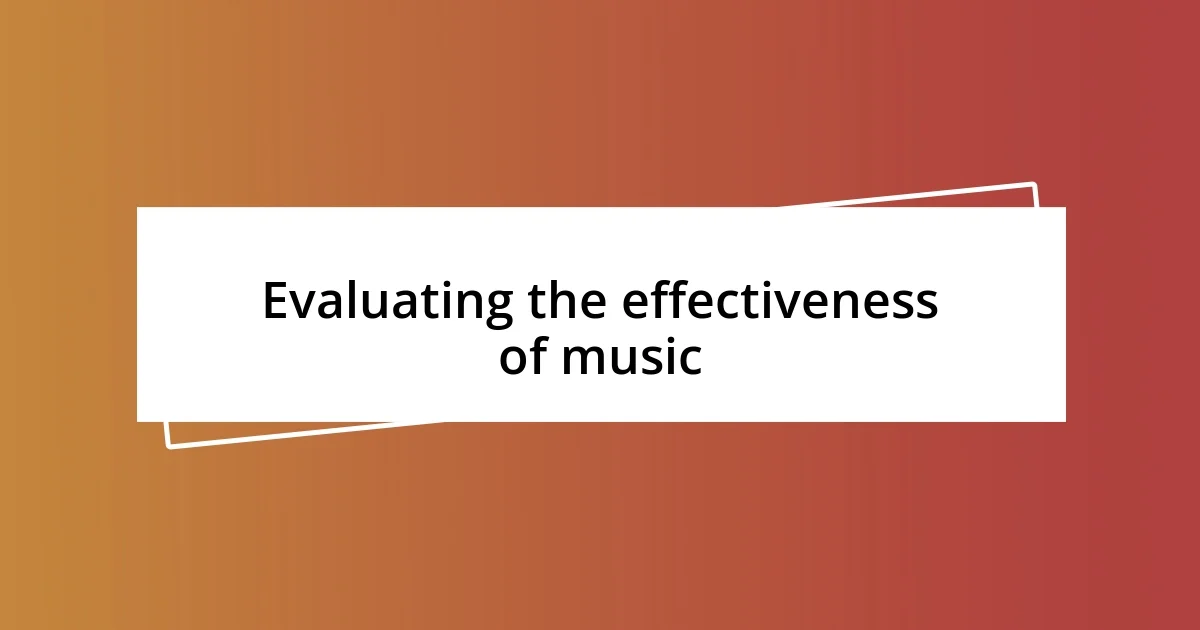
Evaluating the effectiveness of music
Understanding the effectiveness of music in stress relief largely hinges on personal experiences and scientific insights. For me, certain melodies act almost like a balm for my anxious thoughts. I vividly remember a rainy afternoon when I felt particularly overwhelmed; I selected a playlist of calming piano compositions. Each note resonated deep within me, helping to untangle the knots of worry in my mind. Isn’t it fascinating how music can create a space where our emotions can freely express themselves?
Research supports this intimate connection with music by noting its ability to lower cortisol levels, the hormone associated with stress. I felt this firsthand during a daunting presentation at work. As I sat in the waiting area, I played some of my favorite motivational tracks. With each passing song, I noticed my heartbeat slowing, my confidence rising. This experience highlighted how the right music could shift not just my mood but also my physiological responses. Have you ever experienced a moment where music seems to take charge and elevate your spirits?
Moreover, evaluating the effectiveness of music goes beyond mere enjoyment; it’s about the emotional journey it sparks. I love how a simple melody can trigger vivid memories—like the time I danced with friends at a summer party, the laughter mingling with the tunes. In times of stress, revisiting those songs can bring back the joy and warmth of those moments, reminding me that happiness is often just a play button away. Could music be more than just sound? In my experience, it feels like a heartfelt conversation, one that bridges the gap between stress and serenity.












